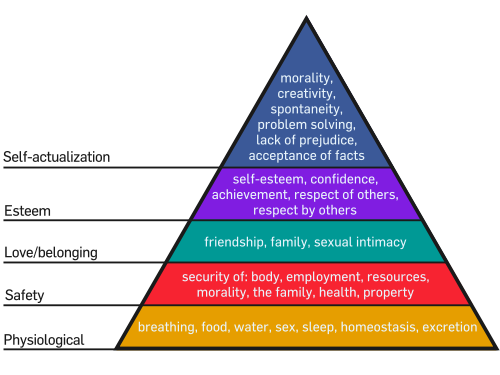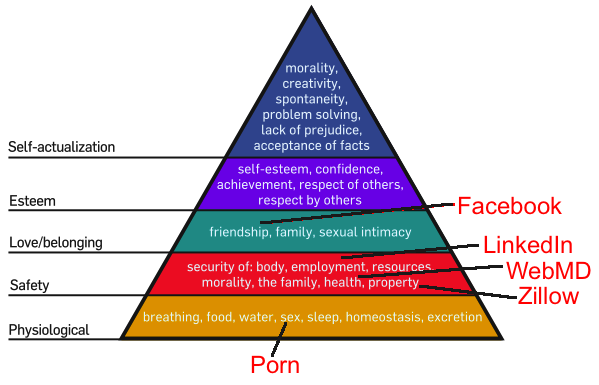Maslov’s “Hierarchy of Needs” comes up pretty often in conversations with my friends. The basic idea of this theory is that people have many needs: a need for food, a need for air, a need for companionship, a need for respect, etc. But moreover, some needs are more important than others, and can be grouped into hierarchical categories. This makes a lot of intuitive sense. If a lonely person falls into a river and is about to drown, her thoughts while thrashing in the water are not about how she needs deeper relationships — she’s thinking about how she needs air! Of course, as one considers “higher” needs, the valuations become harder. Do you really seek morality only after you have satisfied your need for relationships? Wikipedia provides a useful diagram of the needs.
 The theory makes so much intuitive sense, and is talked about so often, that I was a little surprised to learn that it is not respected in Psychological circles and has been much criticised.
The theory makes so much intuitive sense, and is talked about so often, that I was a little surprised to learn that it is not respected in Psychological circles and has been much criticised.
Still, some time ago I had the idea of trying to quantify the needs in Maslov’s heirarchy. That is, I wanted to put hard numbers on them based on real data. For example, how much money do American’s spend on food versus shelter? How has this changed over the last century? How is this different from Germans or Zimbabwaens. Perhaps raw data could paint a clearer picture than Maslov’s speculations.
This turns out to be a harder question than it seems at first. For example, we rarely satisfy one need at a time. When you rent an apartment, you are not just paying for shelter from the rain. You are also paying for the security of walls and doors. You are also paying to be close to the shops in the area, or perhaps paying to be in a beautiful area. You are also paying something for the social status that comes with having that kind of apartment. And you are also paying something for the aesthetic style of the apartment; the fixtures, the quality of the painting and so forth.
In first world countries many of these things have become so standardized that you don’t even consider that you are paying for them. For example, when was the last time you had to choose between indoor or outdoor plumbing? Between electricity or not? I was surprised last year in Berlin when I rented a beautiful apartment that had no automatic heating, but only a stove in which I could burn coal.
Still, I haven’t completely given up on my quest. At the very least, it should be possible to look at trends in a country over time. For example, the USDA has information on the cost of food, showing that Americans now spend half as much money on food as they did 80 years go. Similar data for spending on other Maslovian needs over this time would be interesting: shelter, for example.
If you read this blog, you know that I am also obsessed with the role of “Media.” Maslov’s hierarchy always seemed wrong to me from this angle as well. From my anecdotal experience, it seems that people in developing countries who are “moving up the pyramid”, who have secured food and shelter and security, move quickly to get media — not “self actualization.” This is otherwise known as the “satellite dishes in slums” phenomena, as poignantly expressed in this image.
Lastly, how does the Internet address Maslov’s hierarchy? It seems that the most successful web companies must be tapping into some human need. Some mappings are obvious, like Facebook to friendship. Others are unclear. What needs do Google or Wikipedia satisfy? Where is our need (“need”?) for entertainment, as expressed by YouTube, Netflix, and others? Here is my rough take on assigning web companies to needs in the hierarchy.
Even is Maslov’s theory is flawed, it expresses the right idea that we pursue different needs and attach different values to them. So it will be fascinating to see how technology and especially media has changed out behavior in respect to these needs. I’ll let you know what I find!

Hi,
Great article. I think that Google etc go right into the highest need, self actualization. Some (a lot) want to understand and get more and more knowledge and search on Google for whatever they don’t know. I do. Whatever word, method, subject, I wanna know about, I blindly grab my smart phone and look it up via Google.
And respect of others – esteem – isn’t that the motor under many blogs, Flickr, Facebook etc? We want to show off, and love it when people – preferably out of the blue – react and +1 like ..
Just a few words and thanks for your great article, it helped me in writing my blog about the changes between 2.0 and 3.0 (in dutch, sorry).
Cheers, Laura.